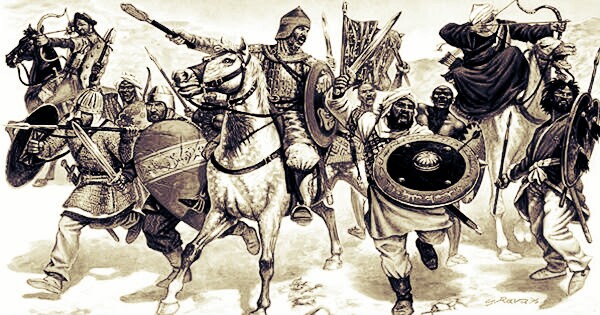The history books of India have been written by Marxist and Islamists fiction writers who have quietly pushed the heroes of the Sanatan Dharma away from public memory. Call this a sad reality or our failure to remember the heroics of the brave fighters. A foreign invader like Bhaktiyar Khilji has an entire town to his name in Bihar, however, the warrior who defeated him is barely known by any.
But who was this king Prithu Rai, who defeated Bakhtiyar Khilji to guard the honour of Bharat Mata? Who was this Prithu Rai that had the steely resolve to go against a barbaric invader with an army much greater than his? Allow us to ruminate.
Born with the name Jalpeshwar, Prithu was a heroic emperor of Kamrup province, whose fame was widespread in every corner of the country. This is the same Kamrup, which we know today as Assam, and which used to be known as ‘Pragjyotishpur’ in Ramayana, Mahabharata, and other Puranas.
Emperor Prithu was also famous as Kameshwar because his family worshipped Goddess Kamateshwari [a form of Maa Durga]. But why did he lock horns with Bakhtiyar Khilji? Why was a fierce warrior from the Northeast forced to take up arms against a Turkish invader?
The year was 1206. This was the time when the Turkish Sultanate was gradually establishing its influence in India, and the culture of India was being destroyed. A campaign that started after the defeat of Prithviraj Chauhan. Qutbuddin Aibak, the then ruler of the Delhi Sultanate looking to expand his empire entrusted Bakhtiyar Khilji to establish the dominance of the Turkish Sultanate in the whole of India.
Iranian historian, Sirajuddin Minhaj-ud-Din in his book ‘Tabaqat-e-Nasiri’ not only confirms how Khilji destroyed the cultural fabric of India but also mentions how Emperor Prithu stopped Khilji in his tracks and forced him to a crushing defeat.
After the destruction of Nalanda University and the massacre of 10,000 scribes/students, Bakhtiyar Khilji marched towards Bengal drenched in his stupor of victory. Khilji also proved victorious in Bengal, after which he set his sight on the Buddhist kingdom of Tibet. But before conquering it, Khilji had to cross the ‘obstacle’ of Kamrup and Sikkim.
Meanwhile, the news of Bakhtiyar Khilji’s atrocities also reached Emperor Prithu. But the fierce warrior in Prithu wasn’t shaken one bit, albeit he held his composure. He found a way to defeat Bakhtiyar Khilji who was still euphoric with his victory spree. Bakhtiyar Khilji was aware that Emperor Prithu was no ordinary warrior, so he proposed a joint invasion of southern Tibet.
Emperor Prithu also accepted his proposal initially, but he did not give his answer till the rainy season. He told the messengers of Khilji in the north that now is not the right time to attack. By the time Khilji established his cantonment at Siliguri, Emperor Prithu had strengthened his army in such a way that he was capable of mounting an offence and fighting the enemy in any situation. He also chose the rainy season because he was aware that the Turkish army had no experience of surviving the rainy season, especially in the Northeast.
Experience and knowledge are the most important aspects in any war, but the Turkish army lacked both these things. Neither did they have experience of the conditions of Northeast India, nor the knowledge of the loyalty of the communities there to the Sanatan culture. On a call from Emperor Prithu, many tribes including Rajbangshi and Bodo gathered, and they decided to fight till their last breath to defeat the Turks.
Bakhtiyar Khilji might have thought he was leading the attack but in reality, he was baited by Emperor Prithu. When it was sure that the enemy had no means to regroup and bring new weapons, Emperor Prithu’s army attacked Khilji from every flank on the battlefield, near the banks of the Brahmaputra. Feeble Turkish soldiers who tried to escape from the clutches of Prithu’s army were either swiftly killed or swept away by the fierce current of the mighty Brahmaputra.
The marauder Bakhtiyar Khilji who came to the Northeast after the massacre of 10000 scholars in Nalanda, who destroyed Vikramshila University, who came with the dream of controlling the whole of Northeast India and Tibet with more than 30,000 fighters was defeated by an ardent devotee of Durga. Khilji was defeated in such a manner that he was never able to show his face to anyone again.
Emperor Prithu pardoned his life not only because he followed Dharma, but also because he wanted to give a clear warning to other invaders through him – if they again dared looked at Bharat Mata and its pious land.
Bakhtiyar Khilji remained alive, but after that, he never dared to attack any kingdom. Ali Mardan, his general based in Bengal, was so enraged by his defeat that he died only after killing Bakhtiyar. This was the same Ali Mardan, who was once forced by Bakhtiyar Khilji to convert his religion.
But look at the irony of our land of India, a city named Bakhtiyarpur is built in the name of the same invader Bakhtiyar Khilji. But leave naming a city in the memory of Prithu Rai, you wouldn’t even find literature or inscriptions about him. There are countless such heroes, who have surrendered their every single fibre of existence to protect India from the bloodlust of foreign invaders. Sadly, they all have been forgotten into oblivion.


























Jai Hind
NCERT and GOI must clean the 90 percent of school books and rewrite the books with real history.
Hindus are made to forget their culture..The Macaulay system shhould go and our own education system suitable for Local 5000 yr and more old Civilization, may be our गुरुकुल सिस्टम….फ्री temples from govt. control….